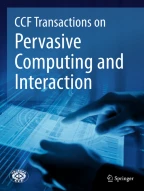Abstract
Pervasive computing is promising to radically change people’s life in several dimensions, including the way we work, travel, have leisure, and take care of ourselves. In order to realize the goal, pervasive technologies must be aware of people’s context and react accordingly by tailoring services and interfaces to the current situation. Unfortunately, today’s pervasive applications have a restricted scope: their visibility is limited to their specific application domain. Hence, they are very well suited to address their specific objective, but lack the overall landscape of the user’s context and goals. In this paper, we put forward the vision of opportunistic pervasive computing: pervasive technologies that can dynamically exploit the available data sources and heterogeneous reasoning services to opportunistically reconstruct the whole landscape of the users’ context and seamlessly adapt to their needs and expectations. We point out the research challenges involved in this vision, and we present a conceptual model and architecture to address these issues, that include solutions for interoperability, reasoning integration, and artificial intelligence tools. Moreover, we introduce technical solutions for opportunistic context data discovery, reasoning and integration, as well as a hybrid method for opportunistic context-aware adaptation. We have also developed a prototype implementation considering an adaptive healthcare application for self-administration of therapies, and a system for opportunistic recognition of different activities based on sensor data. Experimental results indicate the viability and effectiveness of our solution.
Similar content being viewed by others
Notes
References
Acquisti, A., Taylor, C., Wagman, L.: The economics of privacy. J. Econ. Lit. 54(2), 442–92 (2016)
Bettini, C., Pareschi, L., Riboni, D.: Efficient profile aggregation and policy evaluation in a middleware for adaptive mobile applications. Pervasive Mob. Comput. 4(5), 697–718 (2008)
Bettini, C., Riboni, D.: Privacy protection in pervasive systems: state of the art and technical challenges. Pervasive Mob. Comput. 17, 159–174 (2015)
Botts, M., Robin, A.: OpenGIS sensor model language (SensorML) implementation specification. Tech. Rep. OGC 07-000, Open Geospatial Consortium Inc. (2007)
Chen, H., Perich, F., Finin, T.W., Joshi, A.: SOUPA: standard ontology for ubiquitous and pervasive applications. In: Proceedings of MobiQuitous, pp. 258–267. IEEE Computer Society (2004)
Cornwell, J., Fette, I., Hsieh, G., Prabaker, M.K., Rao, J., Tang, K.P., Vaniea, K., Bauer, L., Cranor, L.F., Hong, J.I., McLaren, B., Reiter, M., Sadeh, N.M.: User-controllable security and privacy for pervasive computing. In: Eighth IEEE Workshop on Mobile Computing Systems and Applications, pp. 14–19. IEEE Computer Society (2007)
Curci, S., Mura, A., Riboni, D.: Toward naturalistic self-monitoring of medicine intake. In: Proceedings of the 12th Biannual Conference on Italian SIGCHI Chapter (CHItaly), pp. 3:1–3:6. ACM (2017)
Dey, A.K.: Understanding and using context. Personal Ubiquitous Comput. 5(1), 4–7 (2001)
Dinev, T.: Why would we care about privacy? Eur. J. Inf. Syst. 23(2), 97–102 (2014)
Gu, T., Kwok, Z., Koh, K.K., Pung, H.K.: A mobile framework supporting ontology processing and reasoning. In: 2nd Workshop on Requirements and Solutions for Pervasive Software Infrastructures. ACM (2007)
Gu, T., Pung, H.K., Tan, E., Zhang, D.: Contextpeers: Scalable peer-to-peer search for context information. In: Proceedings of International Workshop on Innovations in Web Infrastructure. WWW2005 (2005)
Gu, T., Pung, H.K., Zhang, D.: Peer-to-peer context reasoning in pervasive computing environments. In: Sixth Annual IEEE International Conference on Pervasive Computing and Communications (PerCom), IEEE Computer Society, pp. 406–411 (2008)
Gu, T., Tan, E., Pung, H.K., Zhang, D.: A peer-to-peer architecture for context lookup. In: 2nd Annual International Conference on Mobile and Ubiquitous Systems (MobiQuitous 2005), IEEE Computer Society, pp. 333–341 (2005)
Guo, B., Zhang, D., Wang, Z., Yu, Z., Zhou, X.: Opportunistic IOT: exploring the harmonious interaction between human and the internet of things. J. Netw. Comput. Appl. 36(6), 1531–1539 (2013)
Hall, M.A., Frank, E., Holmes, G., Pfahringer, B., Reutemann, P., Witten, I.H.: The WEKA data mining software: an update. SIGKDD Explor. 11(1), 10–18 (2009)
Helaoui, R., Riboni, D., Stuckenschmidt, H.: A probabilistic ontological framework for the recognition of multilevel human activities. In: Proceedings of ACM UbiComp, ACM, pp. 345–354 (2013)
Henricksen, K., Indulska, J., Rakotonirainy, A.: Using context and preferences to implement self-adapting pervasive computing applications. Softw. Pract. Exper. 36(11–12), 1307–1330 (2006)
Hull, R., Kumar, B., Lieuwen, D.F., Patel-Schneider, P.F., Sahuguet, A., Varadarajan, S., Vyas, A.: Improving user experience through rule-based service customization. Int. J. Cooperative Inf. Syst. 14(4), 469–502 (2005)
Klyne, G., Reynolds, F., Woodrow, C., Ohto, H., Hjelm, J., Butler, M.H., Tran, L.: Composite capability/preference profiles (CC/PP): structure and vocabularies 1.0, W3C recommendation. Tech. rep., W3C (2004)
Newman, N.: Apple ibeacon technology briefing. J. Direct, Data Digital Market. Pract. 15(3), 222–225 (2014)
Riboni, D., Bettini, C.: COSAR: hybrid reasoning for context-aware activity recognition. Pers. Ubiquitous Comput. 15(3), 271–289 (2011)
Riboni, D., Bettini, C.: OWL 2 modeling and reasoning with complex human activities. Pervasive Mob. Comput. 7(3), 379–395 (2011)
Riboni, D., Bettini, C.: Context provenance to enhance the dependability of ambient intelligence systems. Pers. Ubiquitous Comput. 16(7), 799–818 (2012)
Yu, Z., Nakamura, Y., Jang, S., Kajita, S., Mase, K.: Ontology-based semantic recommendation for context-aware e-learning. In: Proc. of Ubiquitous Intelligence and Computing (UIC), Lecture Notes in Computer Science, vol. 4611, pp. 898–907. Springer (2007)
Zhang, D., Yu, Z., Wang, X., Ma, M.Y.: Supporting development of context-aware applications using semantic space toolkit. IJPRAI 20(4), 585–608 (2006)
Acknowledgements
This work was partially supported by the “DomuSafe” project, funded by Sardinia regional government (CRP 69, L.R. 7 agosto 2007, n.7).
Author information
Authors and Affiliations
Corresponding author
Rights and permissions
About this article
Cite this article
Riboni, D. Opportunistic pervasive computing: adaptive context recognition and interfaces. CCF Trans. Pervasive Comp. Interact. 1, 125–139 (2019). https://doi.org/10.1007/s42486-018-00004-9
Received:
Accepted:
Published:
Issue Date:
DOI: https://doi.org/10.1007/s42486-018-00004-9
